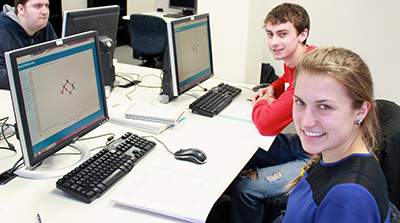
Computational chemists' daily work influences our understanding of the way the world works, helps manufacturers design more productive and efficient processes, characterizes new compounds and materials, and helps other researchers extract useful knowledge from mountains of data. Computational chemistry is also used to study the fundamental properties of atoms, molecules, and chemical reactions, using quantum mechanics and thermodynamics.
Computational chemists use mathematical algorithms, statistics, and large databases to integrate chemical theory and modeling with experimental observations. Some computational chemists create models and simulations of physical processes, and others use statistics and data analysis techniques to extract useful information from large bodies of data. Advances in computer visualization capabilities make it possible for the computational chemist to present complex analyses in a readily understandable form, which they can use to design experiments and new materials and validate the results.
Typical work duties include the following:
- Develop computer models and simulations of chemical and biochemical processes and entities
- Perform and interpret statistical analysis of large datasets
- Create visual representations of reaction pathways, molecular interactions, or other phenomena
- Collaborate with laboratory researchers in industrial, nonprofit, government, or academic laboratories
- Characterize new compounds and processes to support patent claims
- Help develop synthesis processes by identifying and characterizing reaction pathways and identifying the most likely products
- Apply new software and hardware capabilities for data collection and analysis
- Provide customer support as an employee of a service laboratory or a sales or service representative of a scientific software manufacturer
- Teach courses and train students
- Design of experiments
Typical work career paths include the following:
- Applied chemistry
- Physics
- Software development
- Data science & analytics





